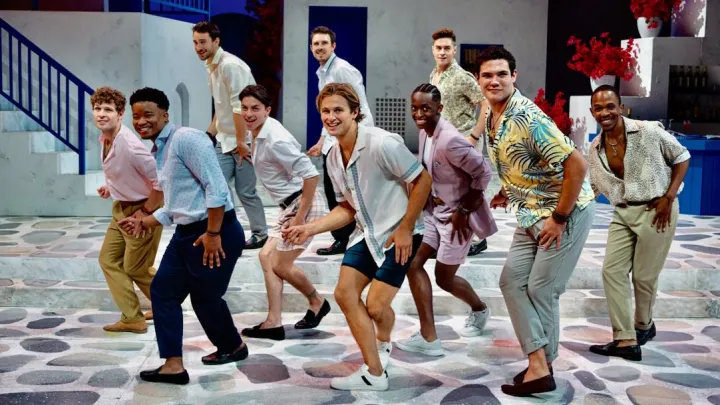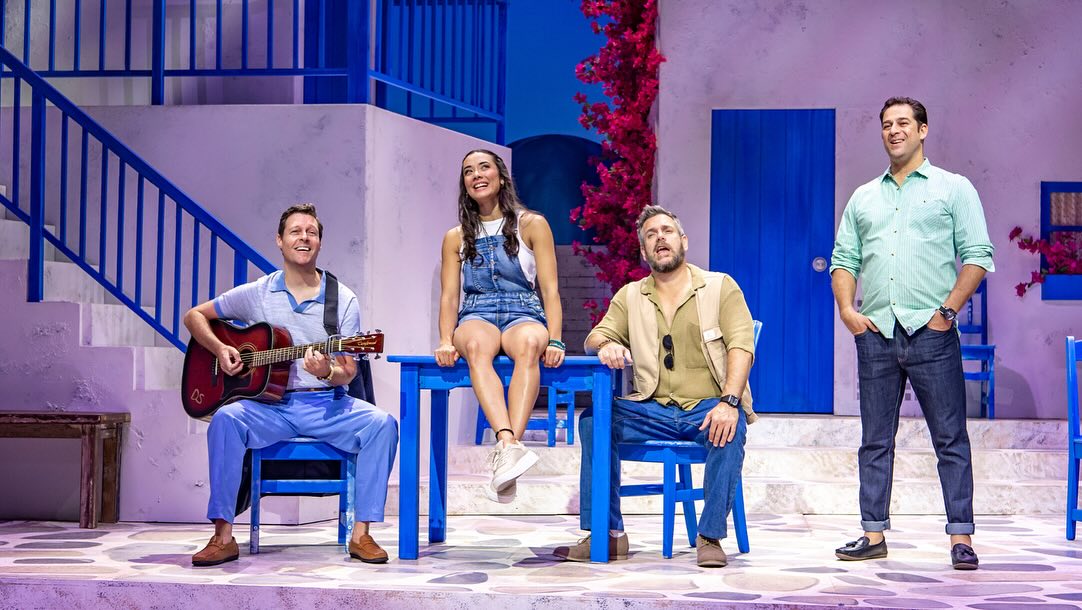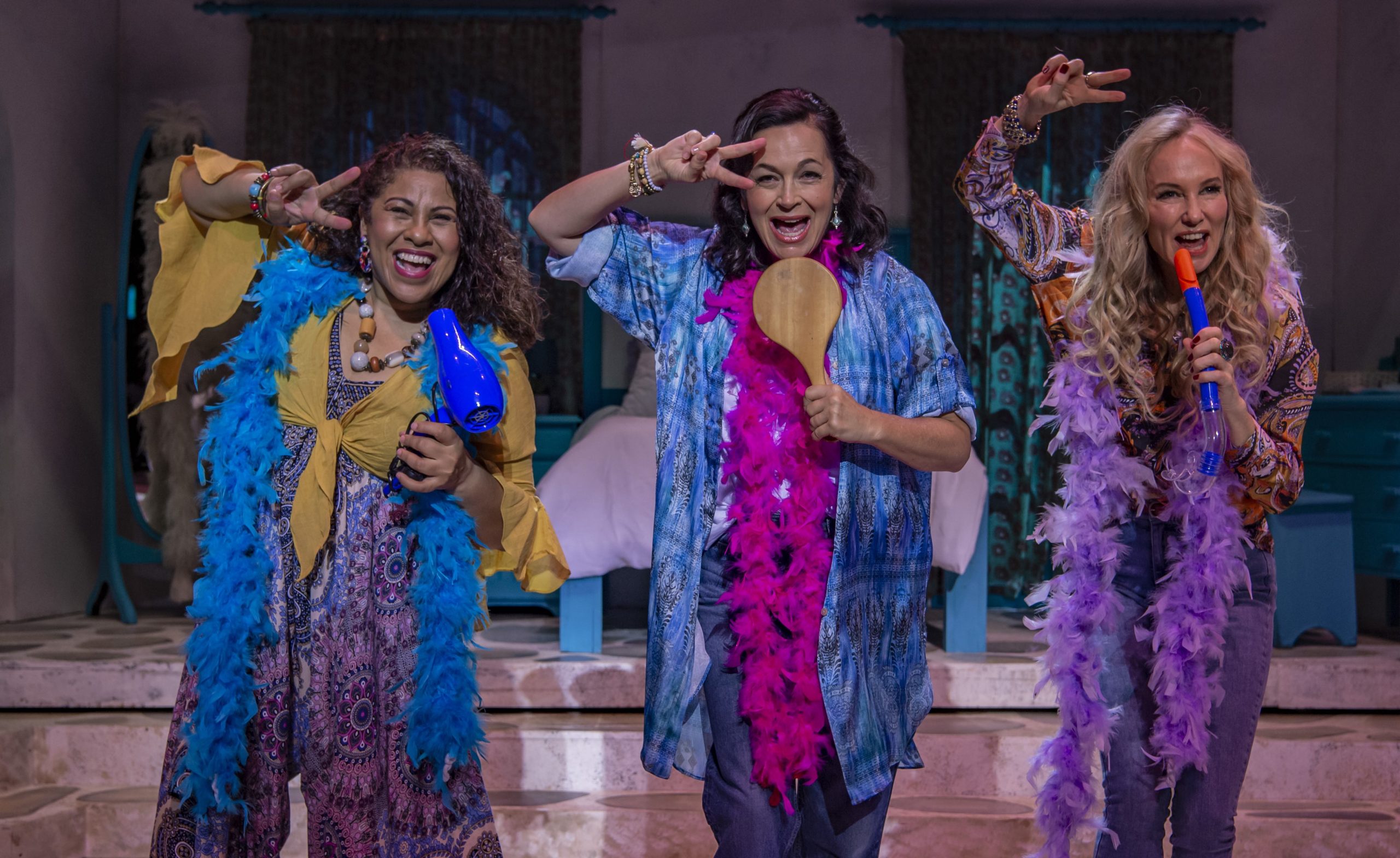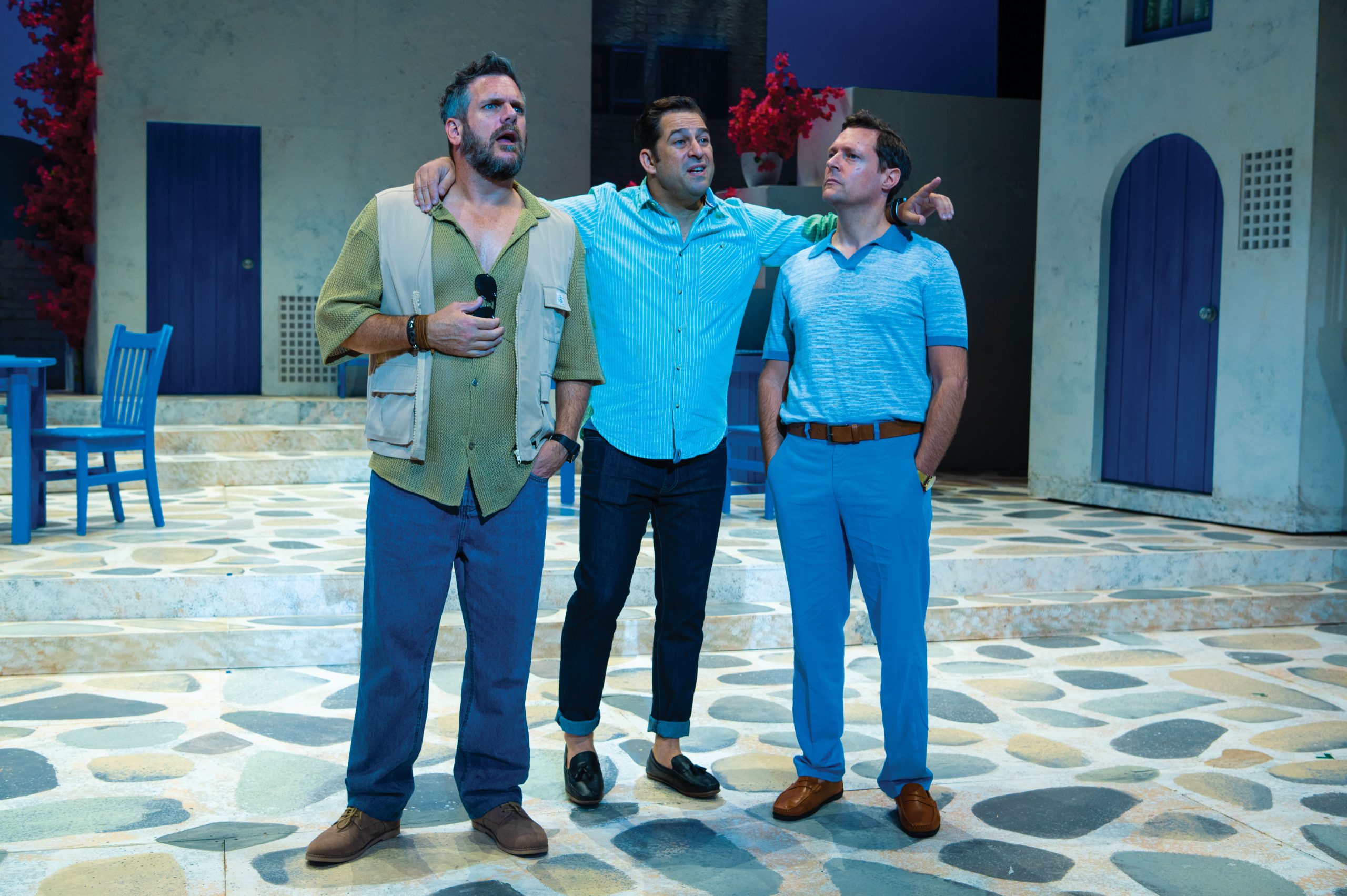THEATRE
‘Mamma Mia!’, or ‘How the Swedes perfected karaoke on a Greek island’

A jukebox musical woven together as a showcase for songs by ABBA, ‘Mamma Mia!’ hits all the anticipated emotional notes. Even if it feels a bit cringe and leans heavily into predictability, doesn’t so much let its happy ending wash over you as drown you in a tsunami of unbridled feel-good escapism.
Mamma Mia! is a bit like karaoke. Better than the average night of karaoke, though, because in this version every song is by ABBA and you in the audience are in no danger of being made to sing next. Although, if you do feel like singing along, no one will begrudge an off-key voice. In fact, since its inception in London in 1999, the show’s always been a kind of build-up to the extended curtain call, when a medley of ABBA favourites doubles as an opportunity for the audience to dance in the aisles, sing and clap along, even get up on stage with the cast.
ABBA is, of course, all about a feeling, a disco-era mood with catchy tunes and an identifiably nostalgic spirit. Those Swedes knew how to craft a hook, and their orchestrations have a soaring, epic quality that produces the sort of stirring music you feel you can drift away on. Their songs are like reliable companions, ones that provide a quick connection with happier times.
Which is perhaps why the indulgent silliness and the kitsch emotional excesses of the show still seem to work so well. When I watched it in Cape Town’s large Artscape Opera auditorium it was packed to the rafters with a delighted, mostly adult crowd, and their exhilaration and delight were tangible. One middle-aged man in front of me was singing along, shoulder dancing and occasionally doing finger claps in appreciation of the on-stage action, much of which was predictable, some of which I thought a little bland, bereft of imagination.
Before Mamma Mia! was created in 1999, ABBA’s Benny Andersson and Björn Ulvaeus had already collaborated on the politically-themed Chess, one of those great musicals that never quite became the box office hit it deserved to be. Together they wrote the music for Chess, and Ulvaeus co-wrote the lyrics with theatre legend Tim Rice, who also penned the story. Chess was first performed in 1984, after ABBA had split up, and was about the rivalry between two chess grandmasters; it featured the hit song, One Night in Bangkok, and was steeped in an undercurrent of Cold War intrigue. It was, if anything, almost too high-minded, too rooted in the sociopolitical turbulence of the times, to properly grab the attention of audiences seeking escape.

Sophie, played by Kiruna-Lind Devar, with her three possible dads, played by Matt Newman, Tiaan Rautenbach and Emmanuel Castis, in a scene from ‘Mamma Mia!’. (Photo: Christiaan Kotze)
Mamma Mia! was, by contrast, written as a holder for popular songs, many of which had already been smash hits. It took some wily writing, manipulative coaxing of emotions and a clever sense of story to drive up the stakes and craft a plot that could sensibly cause its characters to break into song.
Catherine Johnson, the British playwright responsible, deserves a lot of credit for nimbly concocting a storyline emotionally compelling enough to make the slightly nonsensical use of unrelated pop songs magically cohere. And, in many places, have them make sense.
There’s a feminist thread that runs through it, and it celebrates to some extent the erstwhile bohemianism of Donna, the musical’s older central character (deftly played by Gina Shmukler). Her go-it-alone feistiness and personal ambition, plus the fact that she chose to raise her daughter on her own, says a great deal about her – or at least about who she once was.
More significantly, though, the musical touches a nerve familiar to just about every woman and girl in the audience: That feeling of impending loss a mother experiences when she is about to see her daughter married. It is, by all accounts, a story cleverly plotted to ensure that women of just about every age feel a pinch of emotion.
As much as the storyline erupts out of the erstwhile antics of Donna who is now the owner of a cash-strapped taverna on a Greek island, it is also about how that past has come to haunt the present. Donna is a woman pretending that she has no regrets, but where does that leave her daughter, Sophie (Kiruna-Lind Devar), born not only out of wedlock but with no idea who her father is? That lack of certainty about her identity is a weight around her neck.
Throw into the mix a ridiculously gorgeous fiancé (in this production played by the ridiculously talented Gianluca Gironi), and then not just one but three possible dads (played Emmanuel Castis, Matt Newman and Tiaan Rautenbach respectively) who show up for Sophie’s wedding, and you have plenty to tug those heartstrings with.

Reunited on a Greek island in ‘Mamma Mia!’ are Ilse Klink as Rosie, Gina Shmukler as Donna and Kate Normington as Tanya. (Photo: Christiaan Kotze)
Add to the story the reconnection between three middle-aged women who have been bosom buddies since their wild-and-free days, and all the elements for a sentimental potboiler are in place. Not to mention that there’s to be a wedding with all its rituals and opportunities for at-the-altar drama; the outpourings of love, the offerings of advice, the tears and night-before drunkenness, the hangovers, the lustful indiscretions, and the promises of hope for the future.
This concoction would be nothing but a queasy, forgettable soap opera were it not for the intrusion of its effervescent pop songs. The sudden breaking out into singing and dancing is almost a bit of a joke that’s played seriously, like the show is winking at the audience who is winking back. The irony is the laying on thick of a double whammy of kitsch: You came for the karaoke, but it’s the emotional knock over the head from the story that makes those songs feel like something more than a mere endorphin rush.
The trouble is, despite director Janice Honeyman’s great penchant for comedy and the abundance of talent on the stage, there were, on the night I saw it, some glaring gaps.
First, the sound was deficient. Words were drowned out, entire songs somewhat lost. The balance was off, and – for a musical – that’s a major problem.
Then there were the costumes. Half the joy of being on a Greek island is the sense of kicking off one’s shoes, wrapping oneself in a simple sarong and blissing out under the sun. Instead, the cast is costumed like it’s a Mr Price-sponsored pageant – in each scene everyone’s modelling a different kind of beachwear or floral dress. It ends up looking like a mengelmoes, with no regard for the musical’s need for visual coherence, never mind the nostalgia it’s meant to evoke.
There are some whizz-bang song-and-dance routines, but their magic is offset by an aesthetic that transforms the stage into a flamboyant, contemporary beach party rather than helping establish a unifying look. Instead of transporting us to a simpler time, it feels like right now.
So too the lighting which does nothing to set the scene and even less to create a mood. The entire set, in fact, is a bit too slick, too new, and just too much. I’d have loved to see more space for the ensemble to dance in, and less of the stage consumed by bulky structures.
Thank goodness, then, for the rollicking, dedicated cast, each one of them working their butts off to make magic on that stage – even in scenes that felt inadequately thought-through. I loved watching the actors having the time of their lives, even if I sometimes sensed them making their way in the dark, as if they’d not been given much guidance.
Such half-hearted staging was surprising coming from Honeyman, usually so clever with comedy and adept at musical theatre. In several scenes, members of the ensemble seemed to kind of sneak onto the stage, come in as though trying to go unnoticed, lean against a wall or sit at a table, pretending they weren’t there. It was distracting and worrying: Why skulk in the background when everyone understands that this is a musical and we’ve come to see a stage full of singing and dancing? In other scenes, where there might have been action – and some of Duane Alexander’s marvellous choreography – there was stillness, a lack of action, almost a cessation of imagination.
Despite these technical quibbles, I did (even despite myself) feel that thump in my heart, a lump in my throat, and a checklist of happy feelings were definitely evoked.

Tiaan Rautenbach, Emmanuel Castis and Matt Newman play the three possible dads in ‘Mamma Mia!’. (Photo: Christiaan Kotze)
If I’m a sucker for sentiment, I’m in good company. Meryl Streep, who plays Donna in the 2008 film adaptation of Mamma Mia! (the one notorious for showcasing Pierce Brosnan’s accursed singing voice), says she fell in love with the stage show when it opened in New York because she watched it with her daughter and it was the first time she saw her smile after 9/11.
The show was in fact the first new musical to open on Broadway after the terrorist attacks. It was, for many New Yorkers, their first reprieve, their first opportunity to experience joy, the first reason to smile and laugh and dance in the aisles after what was inarguably the worst tragedy in the city’s history. The show became the city’s feel-good sensation at a time when it needed it more than ever. It went on to become one of Broadway’s most beloved shows; when it closed in New York in 2015 it had been performed there 5,773 times and was at the time the seventh-longest-running musical yet on Broadway.
And it’s still a global phenomenon, having been performed in more than 60 countries – its success has even survived a film sequel which received diabolical reviews and included Cher but barely any Streep.
Its power, of course, is its utter focus on generating that feel-good response, its ability to remove one, for a couple of hours, from your current reality and tilt the axis of your world to experience levity, delight, and the awesomeness of seeing and hearing songs you recognise, being performed in the context of a story you know is silly but that nevertheless melts your heart.
That is why Cape Town audiences have been losing their minds over Mamma Mia! It demands nothing of the audience besides its full and unabashed surrender. If you give in to that desire for mindless escape, you will probably overlook the nitty-gritty details and chant “thank you for the music” while standing during a prolonged, roof-raising ovation. DM
Mamma Mia! is playing at Cape Town’s Artscape Opera House until 7 April, after which it transfers to Teatro at Montecasino in Johannesburg from 12 April. Tickets from Ticketmaster.




















 Become an Insider
Become an Insider
Mama Mia does exactly what it’s meant to. Mr Bains critique is mean, precious and grossly self indulgent. Don’t be deterred its great
I agree totally. Mamma Mia is just happiness, taking us away from the troubles here in our country. It is a wonderful musical, with songs we all know. It is not designed to take us to dark places and make us have profound thoughts and feelings. It is joyful, sad, light-hearted and you leave the theatre with a smile on your face and almost dance your way out. I love it.
I also got the feeling that this critique was …. Inappropriate? Misplaced technical blueprint on a joyous production?